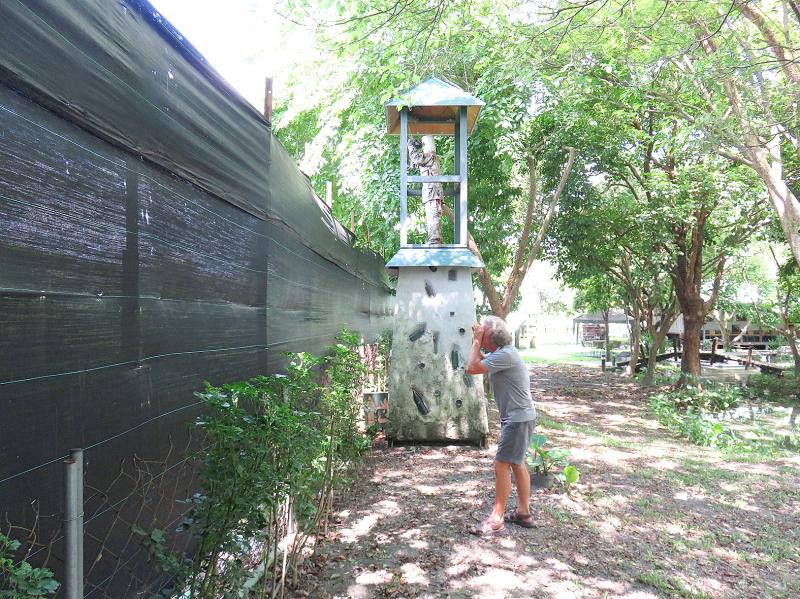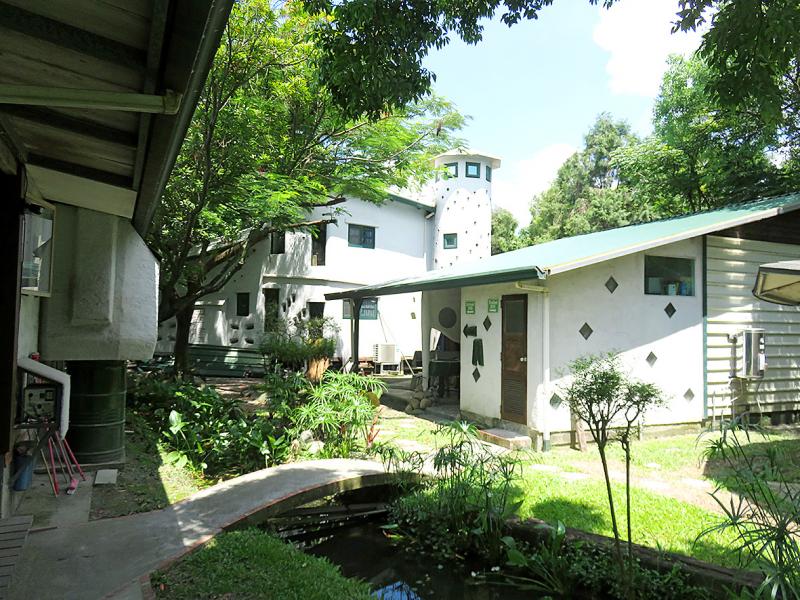The broken authoritarianism of the Chinese Nationalist Party (KMT) planted many cancers in the body of Taiwan’s emerging democracy. Few have done as much harm at the local level as the impunity of local businesses and the weakness of local governments.
Last Thursday my friend John Lamorie, who runs a leisure farm called DaMorLee (大茉莉農莊) in Ligang Township (里港), Pingtung County, invited me down for the day to chat about his situation. In 2006 Lamorie and his wife purchased a plot of rural land for their retirement. That piece of land was surrounded by rural land, with a small plot a stone’s throw away zoned for industrial use.
As time went by the local government came in and asked for permission to use some of the land on the south side of the property to put in an irrigation ditch and a road. Lamorie agreed with the proviso that it should put it as far to one side of his property as they could get it, but this condition was ignored, he says. As a result, a slice of his land is on the other side of the ditch and the road.

Photo: Michael Turton
Lamorie, an energetic and talented man in his 70s, with decades of experience in the building trades, and his wife went ahead and built a lovely leisure farm, which has become well known. It boasts attractive buildings made of papercrete, a pond with over 6,000 fish, trees with several species of nesting birds and an expanse of grass. It has been featured on TV news reports, newspaper articles and several books.
About a decade ago a stone company moved in on the nearby piece of industrial land. They also bought up the neighboring farmland. They built a fence across the road, which had been Lamorie’s land and was then government land, and then tore up a section of the road and put in a parking lot for their trucks. They occupied the slice of his land on the other side of the ditch.
TWILIGHT STRUGGLE

Photo: Michael Turton
Thus began a long twilight struggle, not only with the stone company, but also with the organs of local government, from the executive agencies to the police and the court, simply to get what Lamorie says is an illegal company to return the road to its original state, return his land that they have occupied and take down an enormous black fence they have built along two sides of his property, which he says is on his land.
“Makes the place feel like a prison,” he growls.
Lamorie, who has a rich sense of humor, decided to mock the fence by building a tower to look over it, in which he placed a mannikin dressed as a soldier and holding a pair of binoculars.
When the road along his property’s south edge was put in, Lamorie gave some eight-inch pipe to the construction company to put in for drainage, since none had been planned, he said. He said that the stone company has blocked the pipes several times with stones and concrete.
In 2011 the stone company seized the road, and planted some banana trees on government land. Then they put in a building, but he had that demolished. Lamorie planted some fruit trees on that parcel of land, but the government accused him of stealing it because they had planted trees on it, and they had to pay a fine.
Another time, he took down the fence the stone company had built across the road, and the police came out to ask him about it. That’s right: The stone company can take the government land and put its buildings and trucks on it, no problem. The statistics about factories on farmland hide their true pernicious effect.
One of the most bitter ironies of this affair, from Lamorie’s point of view, is his experience with local officialdom.
“There is no rule of law in Pingtung County,” he says.
Lamorie has written over 2,000 letters to government officials. He says that his tactic is to write officials in Taipei, rather than local officials.
He had dinner with a senior judge once, who told him he should be careful because the stone company was dangerous, a sentiment echoed by the police. If they are dangerous, he asks, “why don’t you people do your job?”
The stone company has fought back in many ways. They posted surveillance cameras to watch his property and once when he removed a cloth from the fence that he says is on his property, and threw it back onto the company’s land, he was successfully prosecuted for vandalism.
Years ago he and his wife operated an English school in Ligang, properly licensed, which he says the stone company threatened to shut down, and which it reported for alleged violations of the law, such as illegally employing foreigners (Lamorie is a Taiwanese citizen).
VIOLATIONS OF THE LAW?
Ironically, says Lamorie, it is the stone company that is doing violating the law. He says he has videos of foreign workers who work at the company doing work that is not permitted by their Alien Resident Certificate.
One night creosote was used to tar one of the buildings on his property, leaving permanent stains.
Another time, the company put plastic trash bins filled with fish guts at one end of the fence next to his farm and a trash bin filled with guts from a slaughterhouse, including the carcass of a butchered dog, at the other. The stench was horrific. He says it took him five weeks to get the Environmental Protection Agency (EPA) to do something about it.
Noise has also been a battleground. Lamorie has had the EPA come and measure the noise levels several times. He says that each time he calls them, the noise from the stone company suddenly falls about 30 minutes before the EPA people arrive, and then remains low until 30 minutes after they leave. Then it resumes.
The EPA also came out when oil leaked from a pipe the stone company had built and killed the fish in his pond. They told him not to eat the fish in the pond, and to protect himself as best he could, and that they were not going to take action against the company.
Another time he reported an illegal building that the company had built on government land. A county official told him it didn’t exist, showing him an old picture from Google Earth. Standing in his office, he says, he demanded they look on the most recent Google Earth. Sure enough, the building was there. Today, years later, it still is.
Then the litany of excuses are commonly heard by anyone who has had to deal with this kind of problem: “other places are noisier” one official told him. “Just leave the farm,” officials suggest.
A local official in a relevant agency, who lived nearby, listed all the illegal things the stone company was doing, Lamorie said, but then did not do anything, according to. The prosecutor in the vandalism case told him that if he didn’t like Taiwan’s laws, he should leave.
Taiwan comes in for much praise for its democracy, but in practice observers mean things like Taiwan’s national and local election processes or its innovative e-government initiatives. Its impoverished, ineffective, unjust and negligent local governments remain, a threat to Taiwan’s democratic consolidation, and too often, a failure for the people who need them.
Notes from Central Taiwan is a column written by long-term resident Michael Turton, who provides incisive commentary informed by three decades of living in and writing about his adoptive country. The views expressed here are his own.

April 28 to May 4 During the Japanese colonial era, a city’s “first” high school typically served Japanese students, while Taiwanese attended the “second” high school. Only in Taichung was this reversed. That’s because when Taichung First High School opened its doors on May 1, 1915 to serve Taiwanese students who were previously barred from secondary education, it was the only high school in town. Former principal Hideo Azukisawa threatened to quit when the government in 1922 attempted to transfer the “first” designation to a new local high school for Japanese students, leading to this unusual situation. Prior to the Taichung First

When the South Vietnamese capital of Saigon fell to the North Vietnamese forces 50 years ago this week, it prompted a mass exodus of some 2 million people — hundreds of thousands fleeing perilously on small boats across open water to escape the communist regime. Many ultimately settled in Southern California’s Orange County in an area now known as “Little Saigon,” not far from Marine Corps Base Camp Pendleton, where the first refugees were airlifted upon reaching the US. The diaspora now also has significant populations in Virginia, Texas and Washington state, as well as in countries including France and Australia.

On April 17, Chinese Nationalist Party (KMT) Chairman Eric Chu (朱立倫) launched a bold campaign to revive and revitalize the KMT base by calling for an impromptu rally at the Taipei prosecutor’s offices to protest recent arrests of KMT recall campaigners over allegations of forgery and fraud involving signatures of dead voters. The protest had no time to apply for permits and was illegal, but that played into the sense of opposition grievance at alleged weaponization of the judiciary by the Democratic Progressive Party (DPP) to “annihilate” the opposition parties. Blamed for faltering recall campaigns and faced with a KMT chair

Article 2 of the Additional Articles of the Constitution of the Republic of China (中華民國憲法增修條文) stipulates that upon a vote of no confidence in the premier, the president can dissolve the legislature within 10 days. If the legislature is dissolved, a new legislative election must be held within 60 days, and the legislators’ terms will then be reckoned from that election. Two weeks ago Taipei Mayor Chiang Wan-an (蔣萬安) of the Chinese Nationalist Party (KMT) proposed that the legislature hold a vote of no confidence in the premier and dare the president to dissolve the legislature. The legislature is currently controlled